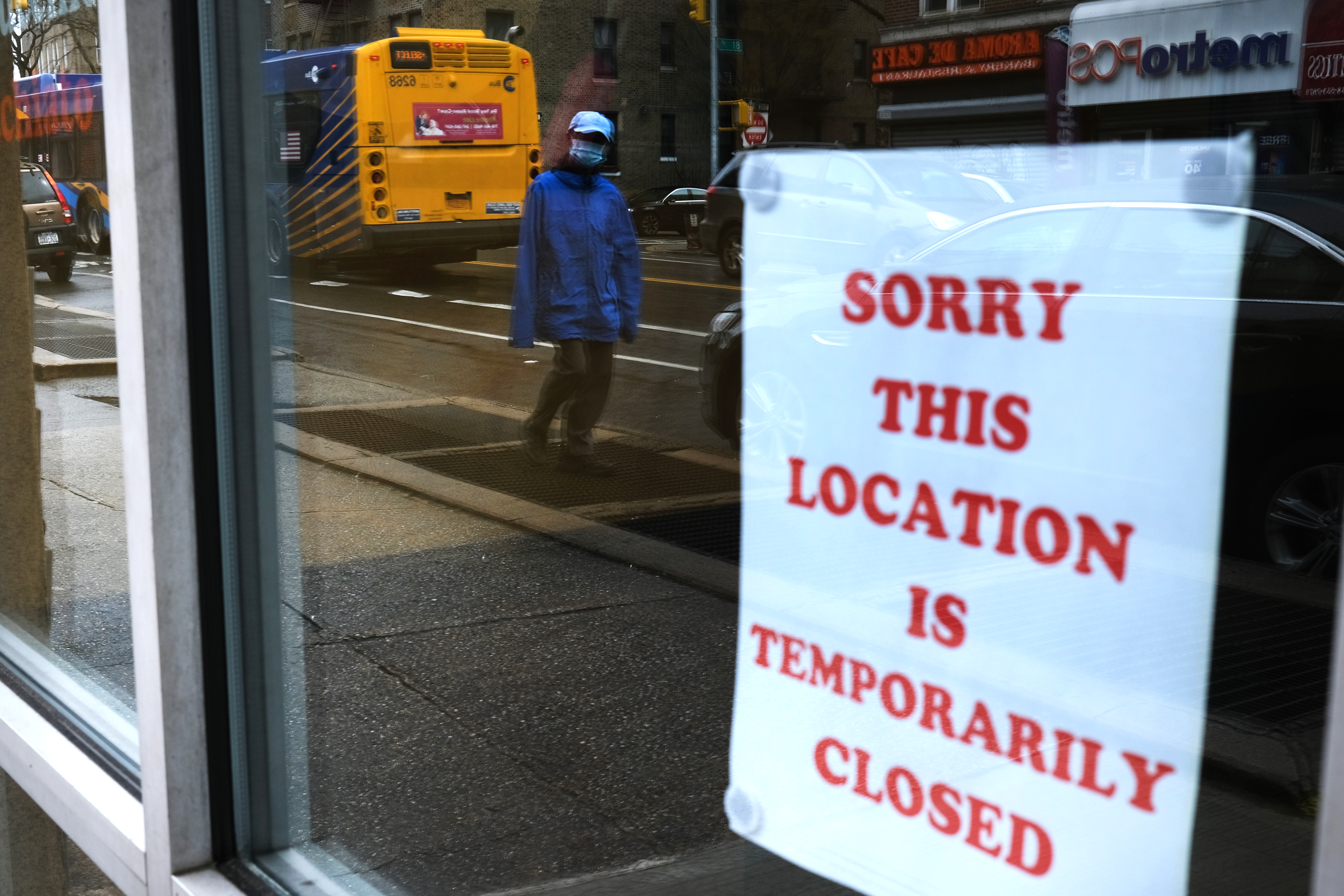The pandemic coverage gap
A third of U.S. companies have "business interruption insurance" — but many won't get a payout for coronavirus

A free daily email with the biggest news stories of the day – and the best features from TheWeek.com
You are now subscribed
Your newsletter sign-up was successful
Here are three of the week's top pieces of financial insight, gathered from around the web:
A better deal for small-business aid
The Treasury Department fixed a central problem with the $349 billion small-business bailout last week, said Eric Levitz at NYMag. The aid package promised companies with fewer than 500 employees loans to cover "the equivalent of eight weeks of your prior average payroll," plus an additional 25 percent. But the loans were supposed to go through the "notoriously lethargic bureaucracy" of the Small Business Administration. Now firms that need help can apply at any bank. Additionally, companies that have already had to lay off workers "can secure forgiveness by 'quickly' rehiring." The government has pledged to "entirely forgive the portion of the loan spent on payroll, benefits, utilities, rent, mortgage payments, or other debts" — in other words, "more or less all of it."
The Week
Escape your echo chamber. Get the facts behind the news, plus analysis from multiple perspectives.

Sign up for The Week's Free Newsletters
From our morning news briefing to a weekly Good News Newsletter, get the best of The Week delivered directly to your inbox.
From our morning news briefing to a weekly Good News Newsletter, get the best of The Week delivered directly to your inbox.
The pandemic coverage gap
A third of U.S. companies have "business interruption insurance," but a policy change to most insurance contracts made after the 2003 SARS outbreak will make it difficult to get a payout, said Todd Frankel at The Washington Post. SARS, or severe acute respiratory syndrome, infected only 8,000 people worldwide but "led to millions of dollars in business-interruption insurance claims." As a result, insurers "added exclusions to standard commercial policies for losses caused by virus or bacteria." Some policies have "civil authority" clauses for "when a government agency stops a business from operating," but these generally require physical damage to be triggered. A restaurant in New Orleans filed a lawsuit last month "claiming the insurer should be required to pay because coronavirus had caused property damage by contaminating surfaces."
Hedge-fund quarantine
For one financial firm, "work from home" means working while secluded with 23 other traders in an empty Four Seasons resort, said Liz McCormick at Bloomberg. Two days before Florida announced a statewide lockdown, Citadel Securities, a corporate cousin of the $32 billion Citadel hedge fund founded by Ken Griffin, opened a "temporary trading floor" in Palm Beach, Fla., inside "part of a hotel property that's closed to the public." The traders, who were flown in from Chicago and New York, "will work and sleep there" and "remain on site" at all times. The firm "built the infrastructure necessary for the Florida facility in less than a week and began trading there when U.S. markets opened" last week.
A free daily email with the biggest news stories of the day – and the best features from TheWeek.com
This article was first published in the latest issue of The Week magazine. If you want to read more like it, try the magazine for a month here.
-
 Will increasing tensions with Iran boil over into war?
Will increasing tensions with Iran boil over into war?Today’s Big Question President Donald Trump has recently been threatening the country
-
 Corruption: The spy sheikh and the president
Corruption: The spy sheikh and the presidentFeature Trump is at the center of another scandal
-
 Putin’s shadow war
Putin’s shadow warFeature The Kremlin is waging a campaign of sabotage and subversion against Ukraine’s allies in the West
-
 The billionaires’ wealth tax: a catastrophe for California?
The billionaires’ wealth tax: a catastrophe for California?Talking Point Peter Thiel and Larry Page preparing to change state residency
-
 Bari Weiss’ ‘60 Minutes’ scandal is about more than one report
Bari Weiss’ ‘60 Minutes’ scandal is about more than one reportIN THE SPOTLIGHT By blocking an approved segment on a controversial prison holding US deportees in El Salvador, the editor-in-chief of CBS News has become the main story
-
 Has Zohran Mamdani shown the Democrats how to win again?
Has Zohran Mamdani shown the Democrats how to win again?Today’s Big Question New York City mayoral election touted as victory for left-wing populists but moderate centrist wins elsewhere present more complex path for Democratic Party
-
 Millions turn out for anti-Trump ‘No Kings’ rallies
Millions turn out for anti-Trump ‘No Kings’ ralliesSpeed Read An estimated 7 million people participated, 2 million more than at the first ‘No Kings’ protest in June
-
 Ghislaine Maxwell: angling for a Trump pardon
Ghislaine Maxwell: angling for a Trump pardonTalking Point Convicted sex trafficker's testimony could shed new light on president's links to Jeffrey Epstein
-
 The last words and final moments of 40 presidents
The last words and final moments of 40 presidentsThe Explainer Some are eloquent quotes worthy of the holders of the highest office in the nation, and others... aren't
-
 The JFK files: the truth at last?
The JFK files: the truth at last?In The Spotlight More than 64,000 previously classified documents relating the 1963 assassination of John F. Kennedy have been released by the Trump administration
-
 'Seriously, not literally': how should the world take Donald Trump?
'Seriously, not literally': how should the world take Donald Trump?Today's big question White House rhetoric and reality look likely to become increasingly blurred